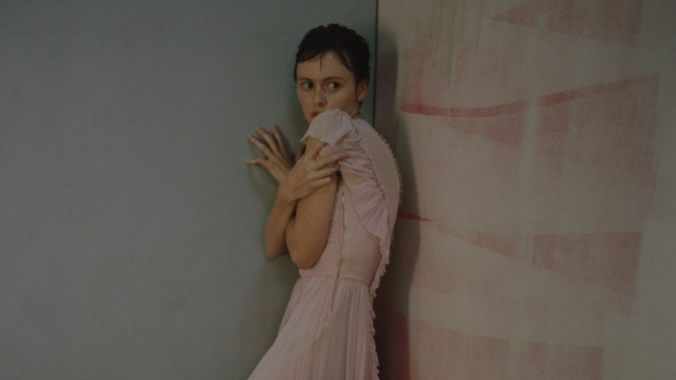Skullcrusher Is Learning to Trust Her Listener
Singer/songwriter Helen Ballentine discusses her debut album Quiet the Room, owning her seemingly disparate influences and finding strength in vulnerability
Photo by Angela Ricciardi
Skullcrusher, aka Helen Ballentine, speaks by unwrapping her words carefully, as if they were contained beneath tissue in a package marked “DELICATE.” The music she makes might seem fragile with its delicate guitar lines and her soft voice, until you realize how anchored in place it is by her electronic inspirations, and the strength of her songwriting. The tension between these two perceptions of her music, as both delicate and forceful, comes to a point in her chosen stage name, Skullcrusher, which she explains: “So I was at one point being like, I want to become a DJ. And I was thinking of my DJ names. And that was one that came to mind specifically because I’ve always felt, like going into these rave situations, [when] you’re just this little person, it’s this really intense hardcore situation, letting out a lot of emotions that are very intense. A close friend of mine and I would—we’re both sort of small people—we would go to some electronic music shows together and wear these big black Doc Marten types. And we would be like, ‘These are our skullcrusher shoes.’”
Ballentine thoughtfully continues, “But I definitely had this strong desire to just push people’s expectations, and maybe question a little bit what people would initially expect from my music. I imagine a lot if I had called myself just my [given] name. [I] probably would have been written about as being like a folk, you know, singer/songwriter type, and I think that there’s absolutely a connotation that comes with that and and people don’t associate that with aggression, or power, in the most basic sense of that word. I feel that often happens where there’s a confusion that arises where it’s like, ‘Oh, this music isn’t strong and powerful and aggressive,’ and to me, it is because there are a lot of aspects of it that are very intense, and there are a lot of parts of me that are very intense, and aggressive, and strong.”
There’s a lot of inner strength that goes into such honest songwriting, taking the leap of faith that her vulnerable creativity will be understood and sensitively received by the listener. “My relationship to the listener is very similar to my other interpersonal relationships,” Ballentine muses. “And, you know, the issues that I have in those relationships are kind of reflected in the way that I interact with my listeners.” It is striking to hear the listener-musician relationship put in such personal terms, listeners being treated not as a removed entity, but rather as people whose opinions matter and have the same impact on her as those of the ones she holds close. And like with any human beings, it is important to thoughtfully cultivate your relationship with them, especially for a person who’s naturally a bit shy: “I think that, for me, it’s both this attempt to be very close with the listener, but then there’s also a fear and a distancing that happens, and a desire to not be seen or heard. I think that has been the push and pull for me where I want my listeners to have a really deep connection with my music and that’s what means a lot to me. But then at the same time, I feel sometimes overwhelmed by the feeling of being perceived by a lot of people.”
But the artist is actively taking steps to learn how to deal with these feelings, for the listener’s sake, as well as her own. “Trust is definitely something that is difficult for me,” Ballentine admits, “and so I tend to want to control every aspect of making sure that everyone knows every single bit of context to me and my songs, and that nobody misunderstands me. I think that when I first started releasing music, I would just drive myself crazy, thinking about how much room for error there is in that pursuit, because it’s just impossible to have everyone understand you 100% in the way that you want to be understood. And so I’ve had to develop more trust that the people who are meant to connect to this music will connect to it in their own way, not in the way that I tell them to.”
Ballentine’s music feels like a balancing act, her voice always walking the line between the folk and atmospherically electronic elements of her sound. Her debut record, Quiet the Room, out now, gets so personal as to include home video voice recordings from her youth, with the theme of her parents’ divorce and other childhood disenchantment floating over it all. With such intimate material finally aired, processing a lot of the resultant pain in the creative process, it makes sense to want to ensure the nature of the reactions of those bending an ear. And this sense of trust in the audience is something Ballentine is still working with and learning in a live setting, especially considering her quieter, more introspective music. Creating that space for calm and reflection alone onstage is no easy feat, as she says: “It’s certainly asking for the audience’s attention. So [performing live has] been about figuring out how to do that. How to make people feel engaged without necessarily having a ton of big things going on onstage.”